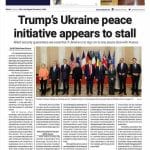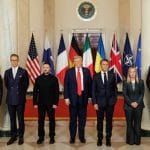On September 3, U.S. Secretary of State Marco Rubio met with Mexican President Claudia Sheinbaum in Mexico City where he declared that security cooperation between the U.S. and Mexico is now closer than ever — “maybe with any country, but certainly in the history of U.S. -Mexico relations.”
For her part, Sheinbaum stressed that all cooperation must respect Mexico’s legal frameworks and sovereignty. She emphasized mutual respect for territorial integrity, framing the collaboration as one of equals — not intervention. Instead of signing a formal security agreement, both sides agreed to establish a high-level implementation group (see below) to regularly coordinate on key issues such as organized crime, drug trafficking, border security, fuel theft, arms and money laundering, and cross-border intelligence sharing. They also discussed bilateral trade issues and the sharing of water resources.
Mexico performing well in areas of concern to Washington
Although not widely known, Mexico has performed relatively well in key areas important to Washington. Since the start of the year, Mexico extradited 55 cartel figures to U.S. authorities — 29 in February and approximately 25 more in August. Mexican officials have also touted a 90 percent reduction in migrant detentions at the border, significant fentanyl seizures, and a 32 percent drop in high-impact crimes.
Regional tensions and Trump uncertainty
Rubio’s Mexico visit came on the heels of a major U.S. military strike in the Caribbean that sank a Venezuelan vessel carrying drugs and killed 11 alleged Tren de Aragua cartel members. Rubio used the trip to reassure Mexico that while regional security actions will continue, any operations on Mexican soil must occur with respect for Mexico’s sovereignty. After Mexico, Rubio continued on to visit Ecuador, focusing on regional counternarcotics issues.
Despite the cordial tone of the Rubio visit, commentators observe that President Trump’s threats (tariffs, unilateral counternarcotics actions) persist, locking Mexico into a delicate position of balancing U.S. expectations with domestic legitimacy.
Joint statement
The text of the following statement was released on September 3 by the Governments of the United States of America and the United Mexican States on the occasion of Secretary Rubio’s official visit:
Begin Text:
Joint Statement on Security Cooperation between the United States and Mexico
The Governments of Mexico and the United States reaffirm our security cooperation, which is based on the principles of reciprocity, respect for sovereignty and territorial integrity, shared and differentiated responsibility, as well as mutual trust. The aim is to work together to dismantle transnational organized crime through enhanced cooperation between our respective national security and law enforcement institutions, and judicial authorities. Additionally, we are working to address the illegal movement of people across the border. This cooperation through specific and immediate actions will strengthen the security along our shared border, halt the trafficking of fentanyl and other illicit drugs, and stop arms trafficking.
The two governments have established a high-level implementation group to meet regularly and follow-up on mutual commitments and actions taken within their own countries, including measures to counter the cartels, strengthen border security, and eliminate clandestine border tunnels, address illicit financial flows, enhance collaboration to prevent fuel theft, increase inspections, investigations, and prosecutions to stop the flow of drugs and arms.
Our close coordination has allowed us to secure the border, reduce fentanyl trafficking, and advance intelligence sharing, all within our respective legal frameworks. The two governments further intend to strengthen collaboration in public health and coordinate campaigns to prevent the abuse of illicit substances and opioids.
Both governments reaffirm their determination to cooperate, protect our citizens, and make our communities safer. End Text.









